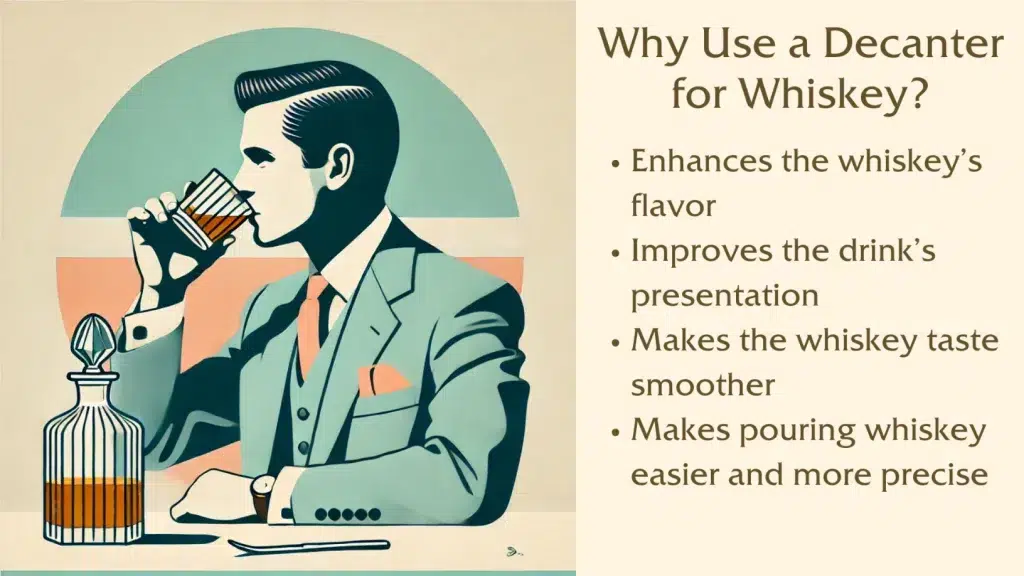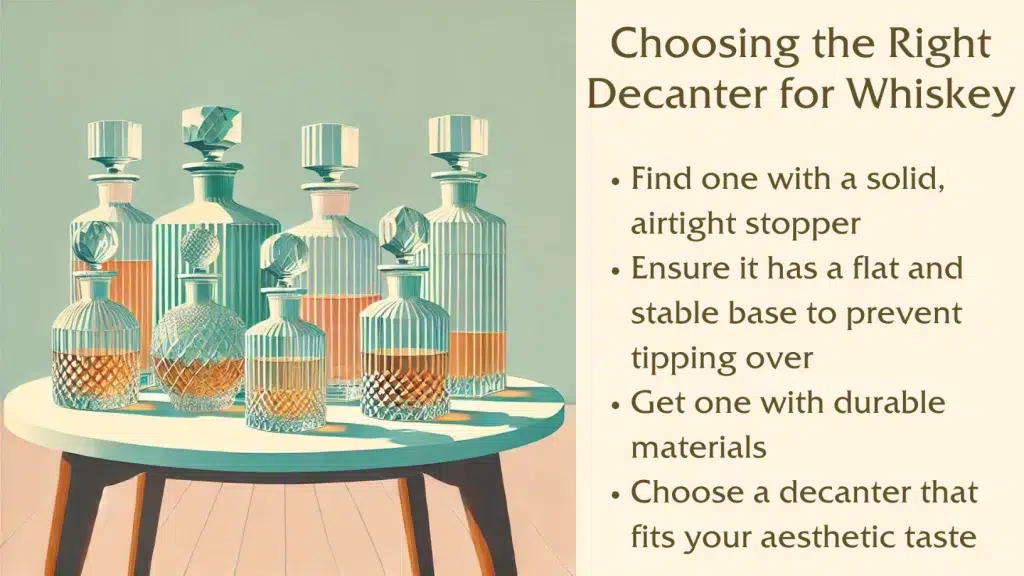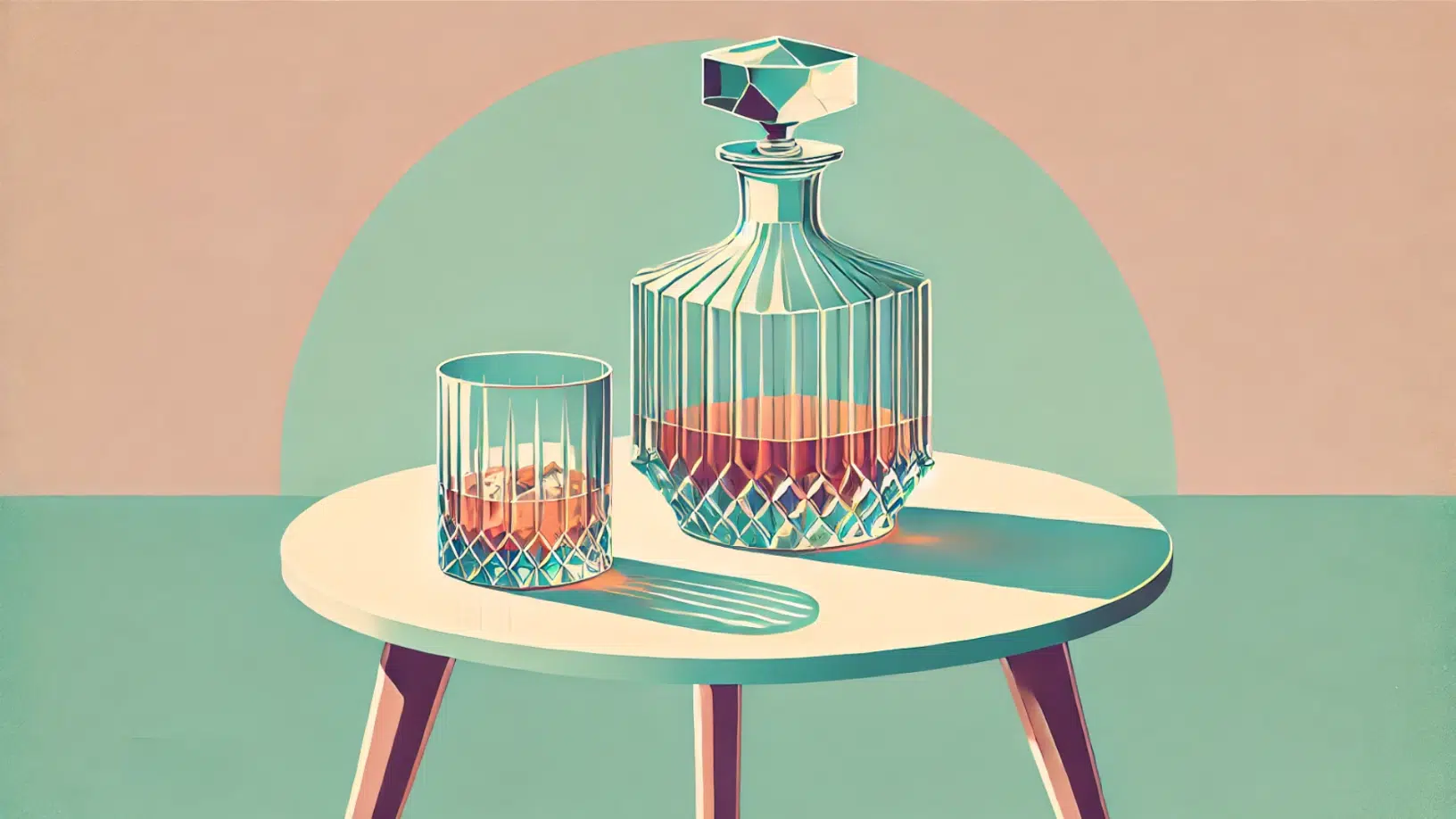Whiskey is more than just a drink—it’s an experience, and how it’s presented can elevate that experience to new heights. While pouring whiskey straight from the bottle is perfectly acceptable, investing in the right whiskey decanter adds a touch of elegance and sophistication to your ritual. A well-chosen decanter isn’t just a visual upgrade for your bar; it also serves a functional purpose, enhancing the flavor and appeal of your whiskey.
One of the key benefits of using a decanter is its ability to interact with oxygen. When whiskey is transferred to a decanter, a small amount of air exposure occurs, which can subtly mellow the spirit and help its complex aromas and flavors open up. This is particularly beneficial for straight spirits, where even slight enhancements in the bouquet and taste can make a noticeable difference. Decanters are also a great way to serve cocktails, adding refinement and ensuring your creations are presented in style.
Aesthetically, decanters can transform your home bar into a focal point. While liquor bottles are often functional, they aren’t always designed to be visually stunning. A handcrafted, lead-free crystal decanter or a uniquely designed glass piece can make a bold statement, turning your whiskey display into a work of art. The craftsmanship of a quality decanter reflects the sophistication of the drink itself, making it an essential accessory for any whiskey enthusiast.
In addition to improving the drinking experience and enhancing presentation, decanters are practical. They help organize your collection, making it easy to showcase and serve your favorite whiskeys without clutter. Whether you prefer a classic design or something with modern flair, a decanter adds a personal touch to your barware, reflecting your style and appreciation for fine spirits.
Choosing the right decanter is as much about form as it is about function. Look for designs that match your taste, materials that ensure durability, and features like airtight seals if long-term storage is a priority. A great decanter not only preserves the quality of your whiskey but also elevates the act of pouring and sharing it, making every sip a celebration of the craft and culture behind the spirit.
Why Should You Use A Decanter For Whiskey?
Using a decanter for whiskey offers much more than just a stylish way to serve your favorite spirit. It enhances the overall experience, from the flavors you savor to the presentation of the drink itself. A decanter is a valuable tool for whiskey enthusiasts, transforming both the sensory and aesthetic aspects of enjoying this sophisticated beverage.

One of the most significant reasons to decant whiskey is the interaction with oxygen that occurs when the spirit is transferred into the decanter. This process, known as aeration, helps open up the whiskey’s complex aromas and flavors, allowing them to fully develop. When whiskey is first poured, the initial sharpness of the alcohol may dominate the nose. However, with a little exposure to oxygen, the harsher notes are softened, revealing a more nuanced bouquet of caramel, vanilla, spices, and other intricate flavors that might otherwise be overshadowed.
The oxidation process doesn’t just affect the aroma—it can also make the whiskey taste smoother and more refined. By breaking down some of the rougher edges of the spirit, decanting enhances the drinking experience, especially for those who enjoy sipping whiskey neat. This is particularly true for bolder, more robust whiskeys, where a touch of aeration can help mellow the intensity while preserving the richness of flavor.
Beyond flavor, using a decanter also improves the visual appeal of your whiskey. Decanters are designed to showcase the clarity and color of the spirit, turning the golden or amber hues of whiskey into a centerpiece for your bar or table. A decanter’s clean lines and transparent glass allow the whiskey’s natural beauty to shine, creating a more inviting and luxurious presentation when pouring a glass.
Aesthetics aside, decanters also offer practical benefits. They provide a consistent and elegant way to serve whiskey, avoiding the often utilitarian appearance of commercial liquor bottles. A beautifully crafted decanter can be a conversation starter, adding sophistication and style to your home bar. Whether made of lead-free crystal, modern glass, or adorned with unique design details, a decanter reflects your personal taste and appreciation for fine spirits.
In essence, a decanter is more than just a vessel for storing whiskey—it’s an enhancement to the entire whiskey experience. By unlocking flavors, softening harshness, and elevating presentation, a decanter bridges the gap between functionality and elegance, allowing you to enjoy your whiskey as it was meant to be: a multisensory indulgence that delights the palate, the nose, and the eye.
Does Whiskey Taste Better Decanted?
Decanting spirits, while often seen as a purely aesthetic choice, serves several practical purposes that enhance the enjoyment of your drink. Even if the process doesn’t dramatically alter the taste of the spirit, it can subtly elevate the experience by allowing the spirit to aerate. When transferred to a decanter, the slight exposure to oxygen can help mellow the sharper, more dominant notes of alcohol, revealing the underlying complexities of the whiskey’s flavor profile. This makes it easier to appreciate the nuanced aromas and tastes that might otherwise be masked by the spirit’s initial strength. Importantly, as long as the decanter has an airtight closure, the quality and integrity of the spirit remain unaffected during storage.
Beyond its functional benefits, decanting adds a layer of sophistication to the presentation of your spirits. A well-crafted decanter not only showcases the clarity and color of the liquid but also elevates the ambiance of your bar or table setting. Spirits poured from a decanter carry a sense of occasion and elegance that can enhance social gatherings or personal indulgence. Whether it’s for aesthetic appeal, practical aeration, or simply to add a touch of class to your collection, decanting is a worthwhile practice that reflects the care and appreciation you have for your favorite spirits.
How Long Can You Leave Whisky In Decanter?
The longevity of whiskey stored in a decanter depends on several factors, including the quality of the decanter, its seal, and the storage environment. A well-crafted, lead-free decanter with an airtight seal can preserve the quality of whiskey for a considerable period—typically anywhere from two months to three years. Maintaining stable conditions, such as consistent temperature, low humidity, and minimal light exposure, is critical to ensuring the whiskey retains its aroma and flavor. Temperature fluctuations and exposure to sunlight can degrade the spirit over time, while a poor seal can lead to oxidation, which may dull the whiskey’s complexity and character.
Even with optimal storage conditions, it’s important to avoid leaving whiskey in a decanter for an extended period. Over time, subtle changes in flavor and aroma may occur, potentially diminishing the spirit’s quality. Decanters are best suited for enhancing the short-term presentation and enjoyment of whiskey rather than long-term storage. For collectors or those looking to preserve whiskey for years, the original bottle with its secure closure remains the best option. By using a decanter wisely and within appropriate timeframes, you can balance aesthetic appeal with the integrity of your favorite spirit.
Is It Safe To Briefly Store Whiskey In A Lead Crystal Decanter?
Storing whiskey briefly in a lead crystal decanter is generally considered safe and poses minimal health risks. While concerns about lead leaching from crystal glassware have been raised, research indicates that the amount of lead transferred to food or drink stored in these vessels for a short period is negligible. The exposure level is significantly lower than the lead typically found in everyday dietary sources, such as water or certain foods. When whiskey is stored in a lead crystal decanter for just a few hours or during a social gathering, the amount of lead that may leach into the spirit is far below levels that would cause harm.
However, it is advisable to avoid prolonged storage of whiskey or any liquid in lead crystal decanters. Over extended periods, the lead leaching could increase to levels that might pose health concerns. To minimize risk while preserving the beauty of using crystal decanters, reserve them for short-term presentation and serving rather than long-term storage. For extended storage, transferring the whiskey back to its original bottle or using a lead-free decanter is the safest option. This approach ensures you can enjoy the elegance of crystal decanters without compromising health or the integrity of your whiskey.
Does Whiskey Lose Flavor In A Decanter?
Contrary to popular belief, transferring whiskey to a decanter does not harm or significantly alter the taste of the spirit. Whiskey is a stable, distilled product with a high alcohol content that helps preserve its flavor over time. The act of decanting, when done properly, can even enhance the whiskey-drinking experience by allowing the spirit to aerate slightly, which may help open up its aroma and flavor profile. The key to maintaining the quality of whiskey in a decanter lies in ensuring the decanter has an airtight seal to minimize excessive exposure to oxygen, which could lead to subtle changes in taste if left unchecked over an extended period.
The longevity of whiskey stored in a decanter also depends on factors such as how often the decanter is opened and how much air enters the container during use. Frequent exposure to oxygen accelerates the oxidation process, which might eventually impact the complexity of the whiskey’s flavors. For optimal storage, decanters are best suited for short-term use and regular enjoyment, as their primary purpose is to enhance presentation and convenience rather than long-term preservation. For extended storage, keeping whiskey in its original, tightly sealed bottle is the best way to maintain its intended flavor and aroma.
What Does A Whiskey Decanter Do?
A whiskey decanter is a must-have for whiskey lovers because it lets them enjoy and appreciate the spirit’s complex flavors. By putting the whiskey in a decanter instead of a bottle, oxygen can mix with the liquid. This oxidation process helps bring out more subtle smells and tastes that might have been hard to notice before. This gives the experience more depth and complexity. Also, many whiskey decanters have a spout that is made for ease of use. This makes it easier and more accurate to pour large amounts or just a taste.
What Kind Of Decanter Should You Look For?
When choosing a decanter, reliability, sturdiness, and functionality should be your top priorities. A high-quality decanter should feature a solid, airtight stopper to prevent any leakage and minimize exposure to air, which helps preserve the flavor and aroma of the whiskey or other spirits stored inside. The base of the decanter should be flat and stable, ensuring it sits securely on any surface without the risk of tipping over. Opting for a decanter made from durable materials such as lead-free glass or crystal with a heavy base is essential for both longevity and the safety of your drink. Stoppers made of stainless steel or rubber are particularly effective at creating a tight seal, keeping your spirits fresh for longer.

Beyond functionality, the aesthetic appeal of a decanter can elevate your home bar and enhance the overall experience of serving and enjoying your favorite spirits. Decanters with intricate detailing, etching, or unique shapes add a touch of sophistication and personalization to your barware collection. Whether you prefer a timeless, classic design or a more modern, artistic style, selecting a decanter that aligns with your taste not only reflects your personality but also enhances the ritual of pouring and savoring a fine drink. A well-chosen decanter combines form and function, offering both practicality and elegance for any occasion.
Can Bacteria Survive In Whiskey?
Research has shown that whiskey is an inhospitable environment for bacterial growth, with no bacteria detected in tested samples. The high alcohol content, typically ranging from 40% ABV or higher, creates a naturally sterile environment that prevents bacteria from thriving. Additionally, whiskey’s low water activity and the presence of antimicrobial compounds further contribute to its resistance to contamination. This ensures that whiskey remains safe for consumption over time, provided it is stored properly in a sealed container away from contaminants.
Is it necessary to rinse my decanter?
It is strongly recommended that you rinse your decanter with warm-to-hot (but not boiling) water as soon as possible after using it. This will help ensure that all traces of alcohol and any other residue are entirely removed, which can be challenging if left for too long. If you rinse your decanter with hot water right after you use it, you can prevent it from getting stained in the future and keep it looking clean and nice. Taking a few extra minutes to rinse your decanter right away can save you lots of time and effort in the long run, as if left uncleaned, residue can harden onto the surface, making it more difficult to remove.
How Often Should You Clean A Whiskey Decanter?
It is important to clean your whiskey decanter regularly to make sure that you are getting the most out of your fine spirits and also to ensure that there are no contaminants or residue buildup. Ideally, it should be cleaned after every use; however, if you do not plan on using it for a while, it is recommended that you clean it at least twice a year. To properly clean your whiskey decanter, start by rinsing it with warm water, and then use a mild dishwashing liquid and a soft cloth to scrub the inside and outside. Make sure the decanter is completely dry, because any leftover liquid can create a place where mold can grow.
Is A Decanter Different Than A Carafe?
A decanter is different from a carafe. While both pieces of glassware are used to store and serve alcoholic beverages, they differ primarily in two ways: the presence of a stopper and a broad base. Decanters typically have a wide, stable base. They feature an accompanying stopper, which serves the purpose of locking in flavor while protecting it from any possible knocks or bumps that may occur during storage. This makes sense, since many decanters are used to store drinks for long periods of time and keep certain flavors from changing.
Why Were Decanters First Created?
Decanters were first developed in England around the turn of the 18th century to store and serve expensive fine wines elegantly and practically. At that time, people spent a lot of money on wine and needed a way to keep it safe and fresh. Decanters offered better protection than other types of containers because they were clear and see-through. This made it easy to spot lees, which were bitter sediments found in many wines that were shipped at the time but hadn’t been filtered. Also, decanters made things look better, which was important when having guests over or going to formal events.
When Were Whiskey Decanters Created?
Whiskey decanters have been around for centuries, and their use can be traced back to the early 1700s. In this era, glassmakers from Great Britain created stoppers that were designed to improve the storage and transportation of whiskey. These new decanters had a tight seal that kept air out and kept the whiskey from getting ruined by air. They also let light pass through. This was an important milestone in developing whiskey decanters since it allowed for higher reliability when storing and transporting the spirit.
How Are Wine And Whiskey Decanters Different?
Whiskey and wine decanters are distinct in several ways. The biggest difference between them might be that whiskey decanters have a stopper that keeps air out, but wine decanters don’t. This is because whiskey has a much longer shelf life than wine and can be stored in glass containers for extended periods without breaking down or losing its flavor or aroma. Also, whiskey decanters tend to be taller and thinner than wine decanters, which usually have a wider shape and base to let oxygen flow through the bottle.
Why Is Whiskey Resistant To Oxidation?
Whiskey’s resistance to oxidation is mainly due to its high alcohol by volume (ABV) content. The ethanol in whiskey acts as a natural preservative, stopping chemical reactions that could change the taste of the whiskey and make it sour or unpleasant. Also, tannins, which are powerful antioxidants, help prevent oxidation by getting rid of free oxygen reactants.
The Bottom Line
Decanting whiskey is more than just a stylish way to display and serve your favorite spirit—it’s a practice that enhances the overall whiskey experience. A well-chosen decanter not only adds a touch of sophistication to your bar but also offers functional benefits such as preserving the aroma and slightly improving the flavor profile. By allowing a controlled amount of oxygen to interact with the whiskey, a decanter can help mellow the harsher alcohol notes, bringing out the spirit’s complex layers of flavor and aroma. Whether you’re serving straight whiskey or using it as a base for cocktails, a decanter enhances the presentation and elevates the drinking experience.
Moreover, a decanter transforms the act of enjoying whiskey into a more refined ritual. Its elegant design showcases the whiskey’s rich color and clarity, turning every pour into a moment of appreciation. While the original bottle may hold sentimental value, a decanter provides an opportunity to personalize and enhance your collection, making it a centerpiece of style and craftsmanship. If you’re looking for a way to elevate your next glass of whiskey, transferring it to a decanter is a simple yet impactful way to combine aesthetic appeal with practical benefits, ensuring every sip is as enjoyable as possible.





